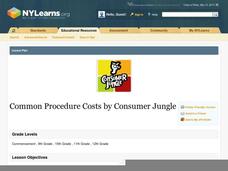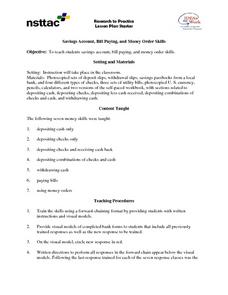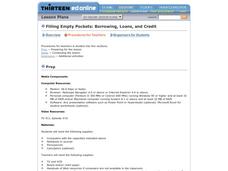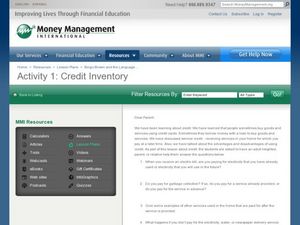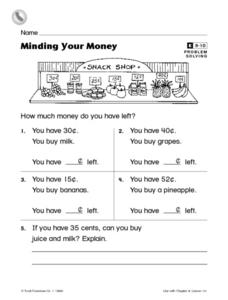Curated OER
Marriage and Financial Goals, Budgeting Strategies
There is no more useful life skill to learn than budgeting and setting financial goals. It's math that is used by every person, everyday. Learners examine the responsibilities and costs involved in family economics. Through a series of...
Federal Reserve Bank
Banking on Debit Cards
What are the advantages and disadvantages of using a credit card versus a debit card? What are the costs of using a debit card irresponsibly? Here you'll find a instructional activity on key concepts that every learner should know...
Curated OER
Money Management Part II: Checking Accounts
Having money is great, learning to manage it wisely is imperative. First, the class has a discussion on the value and convenience of having a checking account. Then, they practice filling out deposit slips, keeping an account register,...
Curated OER
Common Procedure Costs
Kids never think about the cost of medical expenses, because they never think they'll get hurt. To better understand personal financial planning, learners research common medical procedures and their costs. They use a worksheet and the...
Curated OER
Cashing a Check and Using an ATM
Banking is a key skill all individuals should practice. Provide a hands-on exercise to encourage the proper method of writing a check and using an ATM. The lesson prompts special needs students with full assistance until mastery is...
Curated OER
Selecting Lower Priced Grocery Items
As adults, most individuals with special needs must live on a budget. Provide them with money management skills by teaching your class how to make price comparisons while shopping at the grocery store. They work through a series of...
Curated OER
Savings Account, Bill Paying, and Money Order Skills
What do you do after you get a paycheck? Help your mildly disabled learners how to bank wisely with a guided-skills activity. They practice cashing checks, withdrawing money, paying bills, and procuring money orders. The entire learning...
Curated OER
Budgeting for the Future
Eighth graders determine the net amount of an income for a fictional job. They must determine their net worth minus standard deductions. Students must then determine their monthly budget including, groceries, credit, and rent.
Curated OER
Spend, Save, Invest or Donate (9-12)
Students explore the concept of personal finance. In this philanthropy lesson, students examine decisions they make about money as they discover the definitions of philanthropy, resources, scarcity, choice, benefits, costs, opportunity...
Curated OER
From the Mixed Up Files of Mrs. Basil E. Frankweiler
Students listen to From the Mixed-up Files of Mrs. Basil F. Frankweiler and discuss wants and needs. For this iincome and expenses lesson, students relate the adventures of the children in the book to a real life financial situation....
Curated OER
FILLING EMPTY POCKETS: BORROWING, LOANS AND CREDIT.
Students learn that maintaining financial security takes a good math understanding. In this lesson, students apply mathematical formulas to make important financial decisions like getting the right loan to buy a house, decide which...
Curated OER
Money Management
Students role play buying and selling items. For this economics lesson, students are given play money with which to purchase items, as well as value their own items for others to buy. Each student in the group works together to decide...
Curated OER
Money Management Part I: Money and You: An Introduction to Money Management and Budgeting
Learners discuss personal finance and create personal budgets. They discuss the importance of managing their money and how money management skills impact their future. Note: This lesson plan is intended for use with a SMART Board and...
Curated OER
A Big Purchase
Investigate the process of buying a car. High schoolers will use the internet to find cars that are for sale, that they are interested in, and review each car in detail in order to prepare a 3 page paper on which they give the details of...
Curated OER
Checks and Balances
Students discuss elements of financial planning. In this personal finance lesson, students practice filling out personal banking information. Students conduct research using the Internet and a PowerPoint presentation to find out how to...
Curated OER
Credit Inventory
In this money management instructional activity, learners read a paragraph regarding credit and then respond to 6 short answer questions regarding credit.
Curated OER
Visual 1: The Cost of Credit
In this money management worksheet, students examine an advertisement for a bike and respond to 3 questions that require them to calculate percentages
Curated OER
Is the Price Right?
In this money management, students study inflation. Students complete the given table filling in the 15 spaces for the prices of items for three different given years.
Curated OER
The Berenstain Bears' Mad, Mad, Mad Toy Craze
Students explore personal finances. In this money management lesson, students read The Berenstain Bears' Mad, Mad, Mad Toy Craze. Students examine the spending habits of Brother Bear and Sister Bear. Students analyze opportunity costs as...
Curated OER
Scoring a Financial Education
Students explore the concept of money management. In this money management lesson, students read an article about students taking a finance course in high school and college. Students discuss the importance of money management. Students...
Curated OER
Shopping!!!
Students explore money management. In this financial awareness instructional activity, students are given an amount of money and a sheet of objects to choose from to buy. Students choose only five objects they can afford to "buy."
Curated OER
PAY CREDIT WHEN CREDIT IS DUE
Students learn about credit cards and scores and how to and not to use them. In this financial concept lesson, students are given hypothetical scenarios where they are able to apply learning's to given situations as they figure rates,...
Curated OER
Minding Your Money
In this money worksheet, students solve 5 word problems pertaining to buying snacks at a shop. Students determine how much money is left after subtracting the cost of their snack from a specified amount of money.





